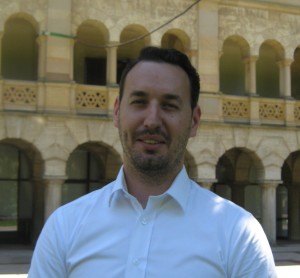Hi, my name is Colm Morrison, I’m a postgraduate student at UWA studying a Master of Science in Medical Physics, and I’m going to tell you a little bit about my experience in the Medical Physics MSc program.
I enrolled in the program in 2012 after reading an article in a state health department liftout of a weekend newspaper, in which was discussed an impeding shortage of medical physicists in Australia due to a growing and ageing population. I had previously completed a Bachelor of Science with Honours in Physics and Nanoscience, following which I had been working for the Australian Red Cross Blood Service. I contacted Associate Professor Michael House, course coordinator for the program, who provided me with the course details and entry requirements. I was thankfully awarded a scholarship for the duration of the course, and was paired up with Genesis Cancer Care Chief Physicist Simon Woodings as a co-supervisor.
GCC had a varied and interesting selection of research topics to choose from, and I decided to undertake an investigation into total body irradiation, a radiotherapy conditioning regimen for bone marrow transplantation, a procedure used in the treatment of diseases such as leukaemia and lymphoma.
The learning experience has just been tremendous. The coursework is taught by experienced physics teachers and industry professionals, bringing with them a wealth of knowledge. Radiation physics is fascinating in and of itself, and studying its medical applications makes it even more so. The UWA Medical Physics Research Group, headed up in radiation oncology by Sir Charles Gairdner Hospital’s Dr Martin Ebert, is a collaboration of researchers, teachers, and PhD and MSc Medical Physics students, which provides an excellent environment of learning, support, and guidance.
GCC has four radiotherapy clinics operating in Perth (with another commencing in 2015), as such I’ve had access to numerous physicists, radiotherapists, and biomedical engineers to answer any and all of my questions. I’ve had an array of dosimetry equipment made available throughout my project, giving me excellent hands on experience. I’ve been able to see first-hand the life of a medical physicist, attending their various duties including equipment quality assurance testing, radiation safety duties, treatment planning matters, and the general day to day behind the scenes activities of a radiotherapy clinic.
Upon completion of the MSc, it is my goal to obtain a Medical Physics Registrar Position. This will include a clinical placement, as well as enrolment in the ACPSEM’s Training Education and Assessment Program, culminating in accreditation as a medical physicist. As a career, I already know how interesting the medical application of physics is, and how rewarding its outcomes are.



